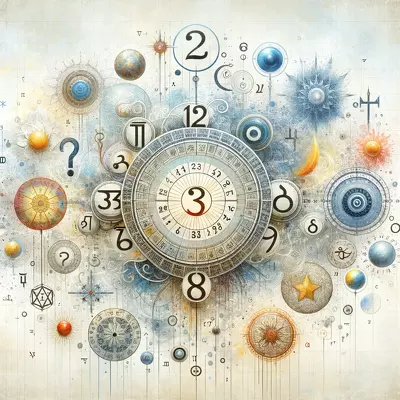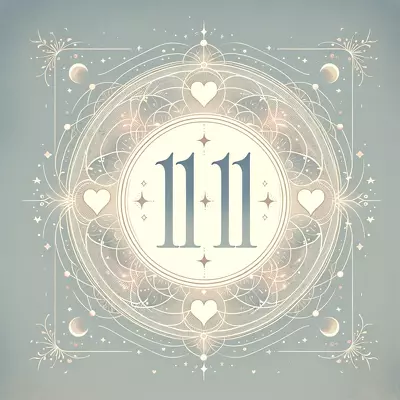The Life-Affirming Symbolism: Unveiling the Number 18 Meaning in Hebrew Culture

In Hebrew, numbers possess unique significance, often derived from biblical or historical contexts. The number 18, for instance, holds a special place due to its association with life and good fortune. This association stems from the Hebrew word for life, “Chai,” which has a numerical value of 18. Exploring this number’s meaning unveils a fascinating blend of numerology, culture, and ancient wisdom.
I. Introduction
A. Significance of Numbers in Hebrew Culture
Numbers have always played a crucial role in Hebrew culture, representing more than mere mathematical symbols. They often carry deep spiritual, historical, and cultural meanings. In Hebrew, numbers are believed to be intermediaries between the earthly and divine, each holding its unique vibration and significance. This ancient understanding permeates various aspects of Jewish life, including religious practices, rituals, and daily interactions.
B. Overview of Hebrew Numerology
Hebrew numerology, or Gematria, is a system where numerical values are assigned to each letter in the Hebrew alphabet. This mystical tradition extends beyond simple number-letter correlations; it delves into the essence of the Hebrew language, unearthing profound insights into scriptural, spiritual, and existential realms. One can discover the universe’s interconnectedness through this ancient lens, symbolized by the Hebrew alphanumeric code.
II. The Special Significance of Number 18
A. Biblical Associations
The number 18 has its roots deeply embedded in the biblical narrative. Its significance can be traced to various scriptural instances where the number 18 is mentioned or its numerical value corresponds to key biblical terms. It’s often seen as a number representing a favorable or divine order, given its multiple appearances in positive contexts within the scriptures.
B. Connection to the Word “Chai”
One of the most revered associations of the number 18 in Hebrew culture is its connection to the word “Chai” (חי), which translates to “life” in English. This association is not merely coincidental but symbolic of the value placed on life within the Jewish tradition. The word “Chai” consists of two Hebrew letters, Chet (ח) and Yud (י), which have numerical values of 8 and 10, respectively, totaling 18.
C. The Numerical Value of Chai
The numerical representation of “Chai” (18) has transcended linguistic boundaries, morphing into a symbol of good luck, blessings, and life-affirmation in the broader Jewish culture. Giving gifts or donations in multiples of 18 is customary as a symbol of bestowing life or good fortune. The concept of Chai, represented by the number 18, forms a fundamental link between daily living and the spiritual aspiration for a good life, blessing, and prosperity.
III. Historical and Modern-day Relevance
A. Ancient Traditions and Beliefs
The reverence towards the number 18 in Hebrew culture has ancient roots, tracing to times when numerology was a significant aspect of understanding the world and divine principles. The biblical and Talmudic eras saw a flourishing of numerical interpretations where numbers like 18 were revered for their mystical meanings. This age-old tradition reflects a profound understanding of life, interconnectivity, and the divine reflected through numerology.
B. Contemporary Celebrations and Practices
Today, the significance of the number 18 continues to thrive in modern Hebrew culture. Giving gifts in multiples of 18 during celebrations is common during celebrations, symbolizing the bestowment of life and good fortune. Additionally, the number is often seen in Jewish celebrations and rituals, preserving the ancient wisdom while adapting to contemporary contexts. The number 18 has become a symbolic representation of Jewish cultural and spiritual identity.
C. Impact on Modern Hebrew Culture
The unique blend of ancient numerological insights with modern-day practices surrounding the number 18 enhances modern Hebrew culture’s cultural richness and spiritual depth. It acts as a bridge connecting the past with the present, fostering a sense of continuity and tradition. Through this number, modern-day practitioners find a tangible link to their heritage, ensuring the perpetuation of age-old wisdom through generations.
IV. Comparative Analysis
A. Similarities with Other Cultures
Ascribing meanings to numbers is not unique to Hebrew culture alone. Many other cultures also indulge in numerology, and some similarities can be found in the reverence of certain numbers. The notion of specific numbers embodying life, luck, or divine connection can be seen across various cultural and religious landscapes. This shared numerical symbolism often reflects universal human experiences or desires for prosperity, longevity, and spiritual connection.
B. Differences in Interpretation
While there may be common ground, the specific interpretations and traditions surrounding the number 18 and its significance vary significantly among different cultures. The Hebrew understanding of the number 18, rooted in biblical narrative and language-specific numerology, sets it apart from other cultural interpretations. These distinctions highlight the rich diversity in how human societies navigate the realm of numerology to make sense of the world and its place within it.
V. FAQs
Q: How is the number 18 connected to the concept of life in Hebrew culture?
A: The number 18 is symbolically connected to the concept of life through the Hebrew word “Chai,” which translates to “life.” The word “Chai” comprises two letters, Chet and Yud, with numerical values of 8 and 10, respectively, totaling 18.
Q: Why is the number 18 considered lucky in Jewish tradition?
A: In Jewish tradition, 18 is deemed lucky due to its association with “Chai” or life. Giving gifts or donations in multiples of 18 is common as a gesture of goodwill or to bestow life and good fortune.
Q: How is the number 18 used in modern Hebrew culture?
A: Modern Hebrew culture often sees the use of the number 18 in celebrations and rituals, where gifts or donations are made in multiples of 18. This practice symbolizes bestowing life, luck, and good fortune, reflecting the ancient connection between the number 18 and the concept of life.
Q: Are there any biblical references associated with the number 18?
A: Yes, the number 18 is present in biblical narratives, although its most profound association comes from its numerical equivalence to the Hebrew word “Chai,” signifying life.
Q: How does the concept of Gematria relate to the number 18 in Hebrew?
A: Gematria is the ancient Hebrew numerology system where each letter corresponds to a numerical value. The number 18’s significance is derived from Gematria, as the sum of the numerical values of the letters in “Chai” is 18.
Q: Are there similar numerological beliefs about the number 18 in other cultures?
A: Yes, numerological beliefs exist in many cultures, although the specific interpretations and the significance of the number 18 may vary. The common thread often relates to universal themes of life, luck, or divine connections.
Q: How has the significance of the number 18 evolved in Hebrew culture?
A: The significance of 18 has remained relatively consistent in Hebrew culture due to its strong biblical and linguistic roots. However, modern interpretations and applications continue to evolve, blending ancient wisdom with contemporary cultural expressions.
VI. Conclusion
A. Bridging Ancient Wisdom and Modern Practice
The tradition of Hebrew numerology, specifically the number 18’s symbolic connection to life, demonstrates the timeless wisdom encapsulated in ancient practices. Even in contemporary times, the rituals and celebrations revolving around this significant number highlight a seamless amalgamation of old and new, carrying forward ancestral knowledge while adapting to the modern milieu.
B. The Continual Relevance of Number 18
The enduring reverence for the number 18 within Hebrew culture speaks volumes about its relevance. Its significance, rooted in biblical texts and solidified by traditions, continues to find resonance among modern-day practitioners. The common practice of gift-giving in multiples of 18 during celebrations is a testament to its undying relevance, fostering a culture that cherishes life, good fortune, and the perpetual flow of blessings.
C. Reflecting Universal Themes Through a Cultural Lens
The significance of the number 18 in Hebrew culture mirrors universal themes of life, luck, and divine connection. While the interpretation may be uniquely Hebrew, the underlying sentiments echo across various cultures, manifesting a shared human experience. The journey into understanding the meaning of the number 18 in Hebrew unveils a rich cultural narrative and nudges at the universal quest for life-affirming symbols and the eternal bond between the temporal and the divine.
VII. Suggested Readings
The following list of books is recommended to further delve into Hebrew numerology and explore the significance of numbers. These readings will comprehensively understand the interplay between numbers, ancient wisdom, and modern interpretations within Hebrew culture and beyond.
- “The Mystery of Numbers: Discovering the Secret Language of the Universe” by David Numeros
- Uncover the universal language of numbers and their profound significance across various cultures, including the Hebrew tradition, in this illuminative book by David Numeros.
“The Power of Numbers: Numerology for a New Age” by Sepharial - Explore the contemporary practice of numerology and discover how ancient numerical wisdom can be applied to modern-day challenges and personal growth.
“Numerology: The Secret Language of Numbers” by David Phillips - Delve into the essence of numerology and understand how numbers, including the special number 18, communicate deeper truths about life and the universe.
“Hebrew Numerology: Keys to the Bible” by Ben Zion Kacav - Unlock the mystical dimensions of the Bible through the lens of Hebrew numerology with Ben Zion Kacav as your guide, revealing how numbers unveil profound biblical insights.
“The Kabbalah of Numbers: Discovering the Inner Meaning of the Hebrew Numbers” by David A. Cooper
These enriching books offer a deep dive into Hebrew numerology, providing readers with a blend of ancient knowledge, spiritual insights, and practical applications in understanding the significant number 18, among others.






